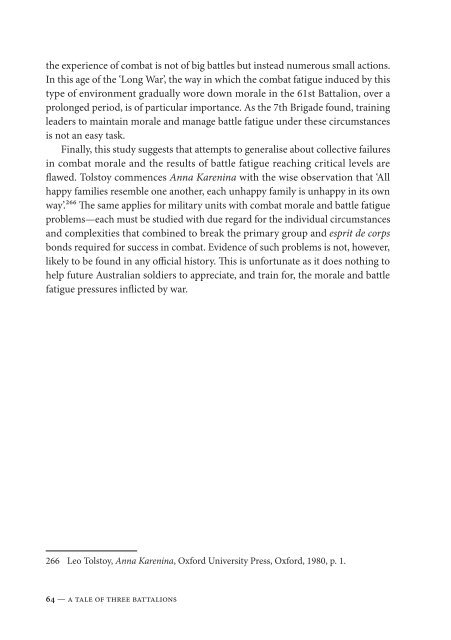View the pdf - Australian Army
View the pdf - Australian Army
View the pdf - Australian Army
Create successful ePaper yourself
Turn your PDF publications into a flip-book with our unique Google optimized e-Paper software.
<strong>the</strong> experience of combat is not of big battles but instead numerous small actions.In this age of <strong>the</strong> ‘Long War’, <strong>the</strong> way in which <strong>the</strong> combat fatigue induced by thistype of environment gradually wore down morale in <strong>the</strong> 61st Battalion, over aprolonged period, is of particular importance. As <strong>the</strong> 7th Brigade found, trainingleaders to maintain morale and manage battle fatigue under <strong>the</strong>se circumstancesis not an easy task.Finally, this study suggests that attempts to generalise about collective failuresin combat morale and <strong>the</strong> results of battle fatigue reaching critical levels areflawed. Tolstoy commences Anna Karenina with <strong>the</strong> wise observation that ‘Allhappy families resemble one ano<strong>the</strong>r, each unhappy family is unhappy in its ownway’.266 The same applies for military units with combat morale and battle fatigueproblems—each must be studied with due regard for <strong>the</strong> individual circumstancesand complexities that combined to break <strong>the</strong> primary group and esprit de corpsbonds required for success in combat. Evidence of such problems is not, however,likely to be found in any official history. This is unfortunate as it does nothing tohelp future <strong>Australian</strong> soldiers to appreciate, and train for, <strong>the</strong> morale and battlefatigue pressures inflicted by war.266 Leo Tolstoy, Anna Karenina, Oxford University Press, Oxford, 1980, p. 1.64 — A tale of three battalions
















